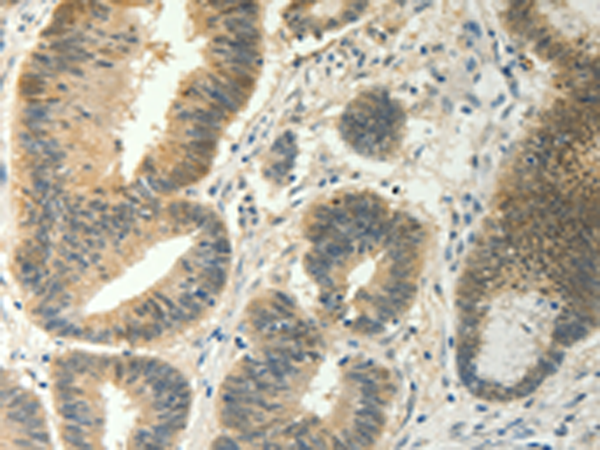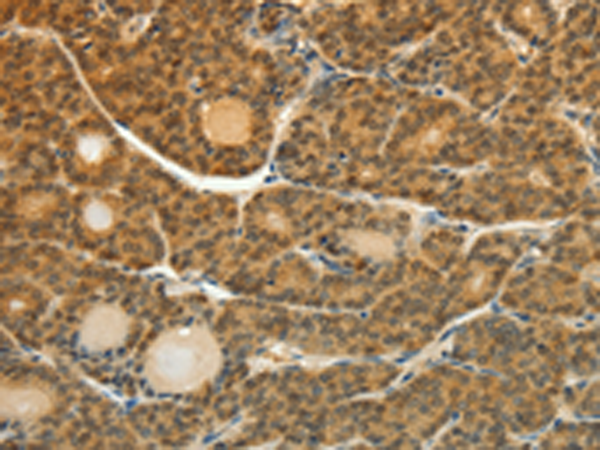

| WB | 咨询技术 | Human,Mouse,Rat |
| IF | 咨询技术 | Human,Mouse,Rat |
| IHC | 1/50-1/200 | Human,Mouse,Rat |
| ICC | 技术咨询 | Human,Mouse,Rat |
| FCM | 咨询技术 | Human,Mouse,Rat |
| Elisa | 1/2000-1/5000 | Human,Mouse,Rat |
| Aliases | CIS6; CISH6; Cish5; SOCS-5 |
| Host/Isotype | Rabbit IgG |
| Antibody Type | Primary antibody |
| Storage | Store at 4°C short term. Aliquot and store at -20°C long term. Avoid freeze/thaw cycles. |
| Species Reactivity | Human, Mouse |
| Immunogen | Fusion protein of human SOCS5 |
| Formulation | Purified antibody in PBS with 0.05% sodium azide and 50% glycerol. |
+ +
1. **"SOCS5 Expression in T Cells Regulates Their Immune Responses"**
*作者:Smith A, et al.*
摘要:探讨SOCS5抗体在T细胞中的表达调控机制及其对Th1/Th2免疫平衡的影响,发现SOCS5通过抑制IL-4信号通路调节T细胞分化,可能成为自身免疫疾病的治疗靶点。
2. **"SOCS5 as a Biomarker in Breast Cancer Progression"**
*作者:Lee J, et al.*
摘要:利用SOCS5抗体检测乳腺癌组织中SOCS5蛋白水平,发现其低表达与肿瘤转移和不良预后相关,提示SOCS5可能通过抑制STAT3通路抑制肿瘤侵袭。
3. **"SOCS5 Antibody Validation for Viral Infection Studies"**
*作者:Garcia R, et al.*
摘要:验证SOCS5抗体的特异性及在病毒感染模型中的应用,证明SOCS5通过调控干扰素信号抑制病毒复制,为抗病毒免疫机制研究提供工具支持。
4. **"Epigenetic Regulation of SOCS5 in Colorectal Cancer"**
*作者:Wang H, et al.*
摘要:通过SOCS5抗体分析结直肠癌样本,揭示启动子甲基化导致SOCS5沉默,促进肿瘤增殖,靶向恢复SOCS5表达可增强化疗敏感性。
The SOCS5 (Suppressor of Cytokine Signaling 5) antibody is a research tool used to study the SOCS5 protein, a member of the SOCS family comprising eight intracellular proteins (SOCS1–7 and CIS). These proteins regulate cytokine signaling by inhibiting the JAK-STAT pathway through direct binding to JAK kinases, cytokine receptors, or signaling complexes, often promoting ubiquitination and degradation of targets. SOCS5 is known to modulate immune responses, cancer progression, and viral infections. It suppresses signaling by interleukins (e.g., IL-4. IL-6) and growth factors, influencing T-helper cell differentiation and tumorigenesis. In cancer, SOCS5 may act as a tumor suppressor by inhibiting EGFR and VEGF pathways, thereby reducing cell proliferation and metastasis. Additionally, it plays roles in viral defense, such as inhibiting hepatitis C virus entry.
The SOCS5 antibody enables detection and functional analysis of SOCS5 in various experimental settings (e.g., Western blot, immunohistochemistry, flow cytometry), aiding investigations into its expression patterns, interactions, and mechanisms in health and disease. Studies using this antibody have highlighted its potential as a therapeutic target or biomarker in inflammatory disorders, cancers, and infections. However, the precise molecular pathways and context-dependent roles of SOCS5 remain under exploration, necessitating further research to clarify its regulatory networks and clinical relevance.
×